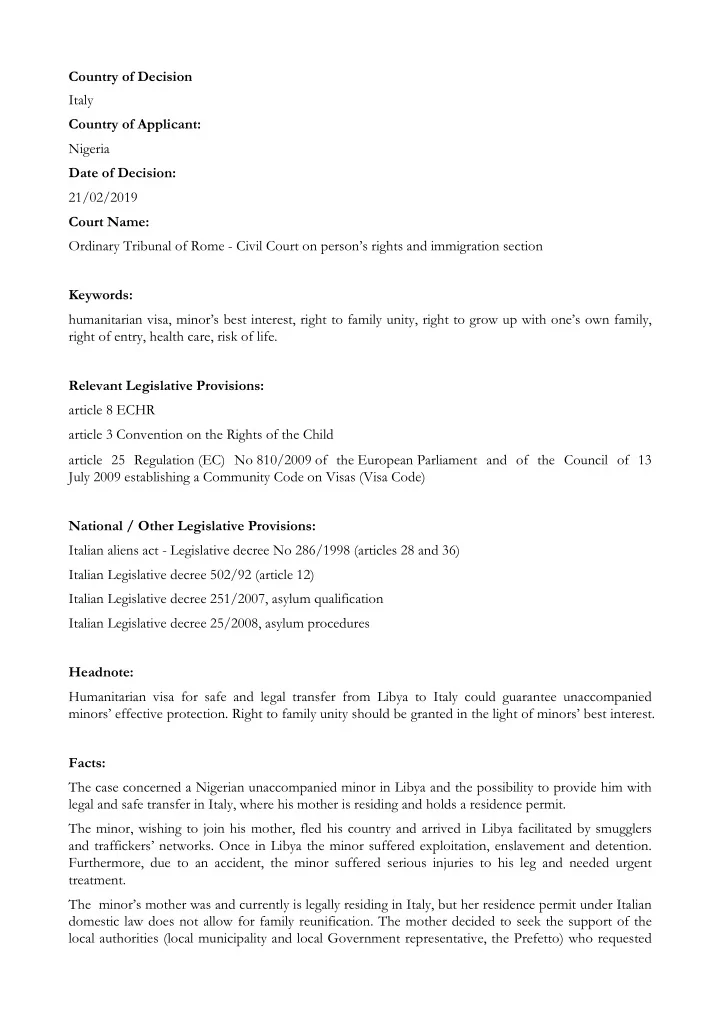

Country of Decision Italy Country of Applicant: Nigeria Date of Decision: 21/02/2019 Court Name: Ordinary Tribunal of Rome - Civil Court on person’s rights and immigration section Keywords: humanitarian visa, minor’s best interest, right to family unity, right to grow up with one’s own family, right of entry, health care, risk of life. Relevant Legislative Provisions: article 8 ECHR article 3 Convention on the Rights of the Child article 25 Regulation (EC) No 810/2009 of the European Parliament and of the Council of 13 July 2009 establishing a Community Code on Visas (Visa Code) National / Other Legislative Provisions: Italian aliens act - Legislative decree No 286/1998 (articles 28 and 36) Italian Legislative decree 502/92 (article 12) Italian Legislative decree 251/2007, asylum qualification Italian Legislative decree 25/2008, asylum procedures Headnote: Humanitarian visa for safe and legal transfer from Libya to Italy could guarantee unaccompanied minors’ effective protection. Right to family unity should be granted in the light of minors’ best interest. Facts: The case concerned a Nigerian unaccompanied minor in Libya and the possibility to provide him with legal and safe transfer in Italy, where his mother is residing and holds a residence permit. The minor, wishing to join his mother, fled his country and arrived in Libya facilitated by smugglers and traffickers’ networks. Once in Libya the minor suffered exploitation, enslavement and detention. Furthermore, due to an accident, the minor suffered serious injuries to his leg and needed urgent treatment. The minor’s mother was and currently is legally residing in Italy, but her residence permit under Italian domestic law does not allow for family reunification. The mother decided to seek the support of the local authorities (local municipality and local Government representative, the Prefetto) who requested
the help of a legal expert on the protection of minors, migration and asylum law. Initially the Italian team of jurists sought support from the UNHCR in Libya, but the Agency was not allowed to contact the Nigerian authorities due to governmental restrictions (see note 98 of the September 2018 UNHCR Report on Libya). The need for protection of the minor was then flagged to the IOM staff operating in Libya, who were able to locate, identify and protect the boy. Despite the IOM’s application, the Nigerian Embassy did not issue an identity document in the interest of the minor, and the informal request for a visa to enter Italy was not followed by any reply on the part of the Italian authorities. Due to the high level of risk and the minor's need for urgent healthcare, Italian lawyers from Asgi (Association for Juridical Studies on Immigration) applied to the Domestic Court (Ordinary Tribunal of Rome) for the issue of an entry visa, on either humanitarian or healthcare grounds, allowing the minor to enter Italy legally and in safety. The lawyers underlined the serious conditions of migrants and persons in special need in Libya evidenced in the reports of various International Agencies and Non- Governmental Organizations. Since the minor held no official document from his country, the IOM's family tracing and the minor’s BID (Best Interests Determination) signed by the UNHCR, IOM and UNICEF in Libya were provided to the Court. Furthermore, the appeal highlighted that neither in Libya nor in Nigeria would the applicant have benefitted from appropriate medical care. Decision & Reasoning: The Court deemed the application admissible, recognizing the applicant’s and her son’s right to be reunited as a family and the minor’s best interest as prescribed by article 8 ECHR, art. 3 of the Convention on the Rights of the Child, by European Law, by the Italian Constitution and Italian Constitutional Court’s and Supreme Court of Cassation’s case-law. The Italian judge also considered the high level of risk in Libya, the minor’s need for urgent healthcare and the impossibility for the minor to access medical assistance in Libya or indeed in his country of origin. On these grounds the Court ordered the Italian Ministry of Foreign Affairs and International Cooperation to issue a humanitarian entry visa pursuant to art. 25, Regulation (EC), No 810/2009 (Visa Code). The Italian Minister of Foreign Affairs and the Italian Minister of Health, formal counterparts of the applicant, did not take part in the proceedings. Outcome: Application accepted. The Court ordered the Italian Ministry of Foreign Affairs and International Cooperation to issue a visa on humanitarian grounds as prescribed by article 25 of Regulation (EC), No 810/2009 (Visa Code). The Italian Embassy in Tripoli issued a laissez-passer for identification purposes and a visa with limited territorial validity on the ground of “invitation” (domestic visa type C), as Italian national law does not provide for an entry visa for “humanitarian reasons”. The minor eventually reached Italy thanks to the IOM’s support for travel and protection. Other sources cited: Refugee Convention 1951 Directive 2011/95/EU– Qualification Directives Directive 2013/32/EU – Procedure Directives UNHCR Report on Libya, September 2018 and 18 December 2018 “ EASO – Country of Origin Information Report: Nigeria”, June 2017 and November 2018 International Criminal Court position 8 May 2017
EU and domestic case law: CJEU, C-638/16, X and X v. Belgium Italian Constitutional Court, decision No 28/1995: “ the right and duty to support and bring up children, therefore the right of parents and minor children to a common life and family unity are fundamental human rights: these rights are also to be guaranteed for foreigners ” Italian Court of Cassation, decisions No 1714/2001, No 8582/2008 and No 12680/2009
Recommend
More recommend